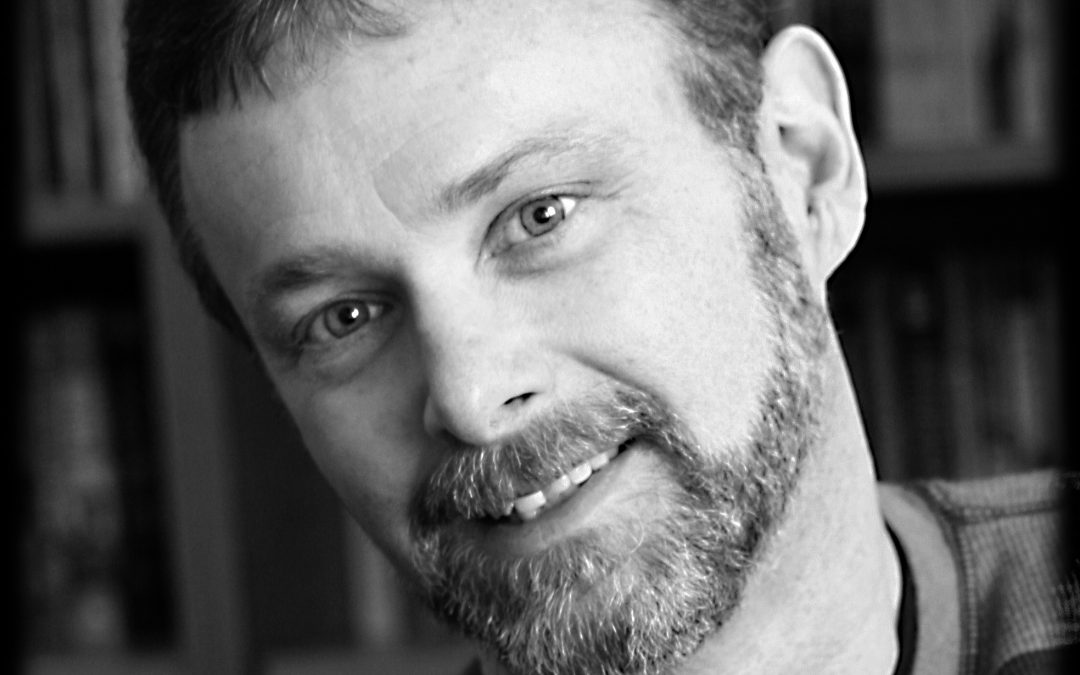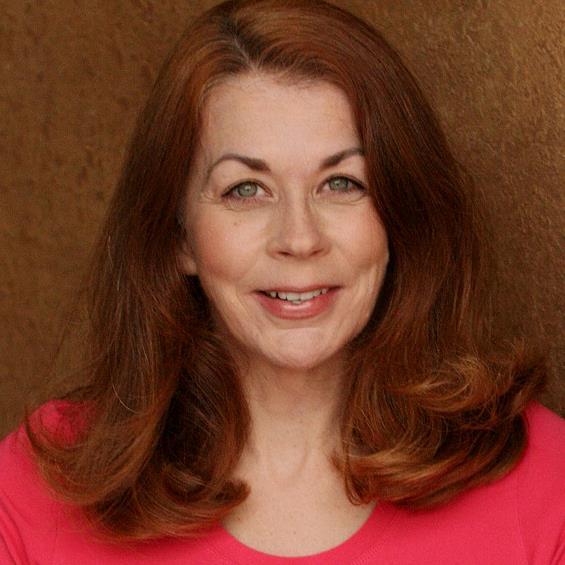
Christopher Moore
It would be hard to find an author capable of creating more offbeat, unique and utterly enjoyable stories than comic fantasy superstar Christopher Moore. From his own unique take on the life of Christ as told by the man’s good friend Biff (Lamb) to the latest adventures of his fourteen-inch-tall “meat puppet” Charlie Asher in his latest, Secondhand Souls, Moore is a regular resident of the NYT and international bestseller lists. He is also without question one of the funniest, most clever writers to be found anywhere. He shared some time with The Open Mic recently to talk about how he does what he does so well, his penchant for quirky social commentary and the art and craft of being funny.
RE: Humor and satire are such difficult things to do well – a lot of people think they are much funnier than they actually are. But you make it look so easy. Does it come to you as naturally as it seems?
MOORE: I’m not sure, “easy” is the word, but I’d say “naturally”. What I mean by that, is that my default reaction to the world is to make fun, find a funny way to say something, so when I research, for instance, I’m not so much looking for way to verify facts, but trying to find new things to react to. Sometimes revisiting older material can invoke that reaction, too. The difficult part is putting the humor into the context of a story, giving characters a world to live in where we can see the humor, even in very dark situations. That’s not only difficult, it takes a lot of time. If I didn’t write funny books I think I could turn them out about four times faster than I do now. I can’t just outline and fill in the blanks with plot and tension, I have to figure out a way to bring humor, or at least irony, into every scene.
RE: You weave in a lot of really spot-on social commentary in your books. Was that always your intent? Do you ever find yourself pulling back from something or changing it in fear you might offend someone?
MOORE: Not very often. I think we all have second thoughts about the first thing that pops into our head. I’m less worried about offending someone than with pulling them out of the story because of something I wrote. I remember after the first draft of Lamb, my wife and another friend, a reader I trust, both came back with the same comment, “It bothers me when Josh (Jesus) says the F-word.” Since the success of that book depended on the reader not putting up shields, I changed every instance of that except one or two, I think, where I thought it was just a particularly funny joke that couldn’t be passed up.
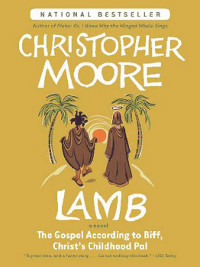
Jesus’s best bud…Biff!
RE: That said, your comic take on the life of Jesus, “Lamb,” is one of the funniest things I’ve ever read. Were you concerned at all that you might get a lot of blowback from folks with less of a sense of humor about such things?
MOORE: I guess I was concerned, but not afraid. I really did think there would be some blowback, but the novel, as you know, is not an attack book. I’m not trying to challenge anyone’s faith, I’m just telling a familiar story in a funny way. As it turns out, people really did get the joke, even people of faith, so I’ve been pleasantly surprised.
RE: I’ve heard comedians complain that being funny for a living can be a drag because people then expect you to be a laugh riot all the time. Do random people ever ask you to “say something funny?”
MOORE: Not very often. I’m not really a performer, so just standing there and saying funny stuff is not expected from me the way it is from comedians. I’m often asked to write funny stuff, and often for free, and that can be irritating, because people seem to think there’s no work involved in the process, but people asking me to be funny on demand, in person, seldom happens. More often than not they’re surprised if I’m funny in person, because when I talk about my work, I’m pretty serious about the craft.
RE: The USA Today’s review of “Secondhand Souls” referred to your characters as “kinda-ordinary, anti-hero weirdos.” That could describe a lot of the characters in your work, which is why we love and relate to them. What is your character development process like?
MOORE: Well, first I figure out what I need the character to do, and then I try to create a character who will do that, or for whom those actions will be a challenge. For instance, with A Dirty Job, the prequel to Secondhand Souls, the premise that first occurred to me was, “What if a guy who was a hypochondriac got the job of being Death.” So I start with something like that, and build a character up for whom the job of Death is completely contrary to his personality. Voila, humor. I know it looks wonky stated like that, but that’s how I do it. I start with what I need them to do, then I try to make it more interesting. A great teacher of mine used to say, “The most important thing you need to know about a character is what they want and what they’re willing to do to get it.” I always use that question when building characters, even minor ones. It informs their dialog and gives the scenes another layer.
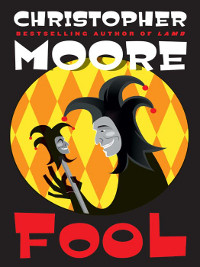
Pocket in da’ house!
RE: Do you have a favorite character you’ve created?
MOORE: I suppose if I take credit for Pocket, my diminutive fool from Fool and The Serpent of Venice, he would be my favorite, but to be fair, I did start with Shakespeare’s fool from Lear, I just gave him a history and a bit more personality, but he’s so wildly clever and profane, that I love writing him.
RE: I’ve read that you didn’t really start out intending to write comic fantasy. Who were/are your literary inspirations?
MOORE: Well, I started out thinking I was a horror story writer, so I started being influenced by Robert Bloch, Richard Matheson, Ray Bradbury, Stephen King, and quite a few others, back to Poe, but when I read my stories in workshops, people would laugh at them, so I thought, “Hell, maybe this is what I do.” I guess it’s like going out for the baseball team and someone watching you move and saying, “You know what sport you’d be good at? Checkers.” Anyway, as I started down the road to writing funny stories, my influences were Tom Robbins, Kurt Vonnegut, Douglas Adams, and John Steinbeck.
RE: Your books often combine great original storytelling overlaid on familiar works like King Lear (Fool, The Serpent of Venice), the life of Vincent Van Gogh (Sacre Bleu) and that aforementioned Jesus fellow. What’s the inspiration behind this? Is there another great literary work you are planning to take on any time soon?
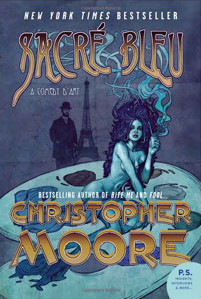
Van Gogh and Toulouse Lautrec – what’s not to like?
MOORE: Well, the inspiration behind those other books are a love of Shakespeare, 19th Century art, and Paris.
I’ve already worked out a story based on another Shakespeare play, but my publisher wasn’t interested right now, so that will happen at some point, I hope, and I’ve looked at some other works from the Romantic period, but I don’t know if my idea will work, so I’ll keep it close to the vest, right now. I have been looking at Don Quixote for years now, trying to figure a take on it, but I haven’t been able to find an angle that will help me bring it to a modern audience yet. Maybe I’ll accidentally get smarter or something and figure it out.
RE: Social media is a must these days, which I’m grateful for because that’s how we connected. Some writers I’ve spoken to love Twitter and Facebook et al, others just hate it. Where do you fall? And how do you use it the most?
MOORE: I don’t think it helps you get any work done, that’s for sure. I enjoy Twitter, because, as I said, I react to the world in a humorous way, and what funny stuff I think of doesn’t often fit in the context of the book I’m working on, so, for instance, if I see a news story that strikes me funny, I can post my comments and hope that it strikes other people as funny, too. That’s really the value to me. You can get very isolated as a writer when you’re working, and social media can mitigate the sense of loneliness that might arise. That said, it’s way more fun to make fun of some political buffoon with a bunch of clever friends than it is to break through on a difficult scene you’re working on, so social media is dismal for productivity. I have to limit, myself, as well. There just isn’t enough time to engage on five or six platforms and still get my work done. I focus my jokes and political chatter on Twitter, mainly use Facebook for announcements and keeping my readers apprised on what’s going on with my books, and I’m almost completely passive on Reddit and Goodreads. I don’t do Instagram, Snapchat, or Linked-in at all. There just isn’t time.
RE: Your work seems to be such a natural fit for film or TV – will we see that happen at some point?
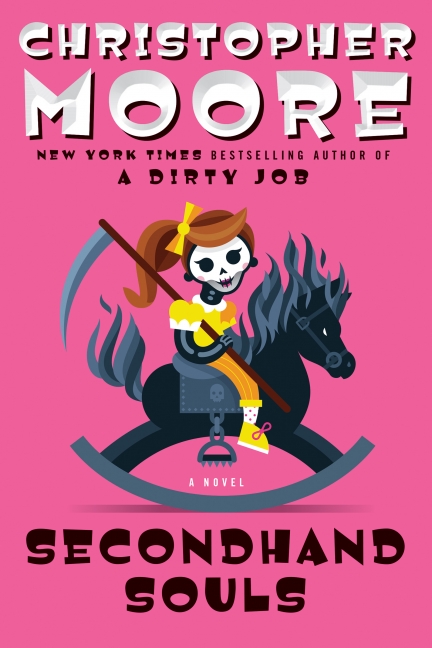
Secondhand Souls – a first rate story!
MOORE: There are a couple of projects in active development right now, and a few that are in what I’d call, “development purgatory”, meaning that I don’t think anyone is doing anything with them, but when you call them, they are very perky and enthusiastic and can never cite any progress. A Dirty Job is in development at Universal Cable right now, which is the corporation for a bunch of networks, and the pilot is finished, and was written by someone who gets the material, so something might happen there. As for the rest of them, and I think right now about half the books are under option or have sold outright for film, nothing seems to be in danger of getting made any time soon. I have no idea why. I don’t really get involved in the film and television process because I can take that time and use it to get another book done, instead of trying to usher a project that I don’t have control over.
RE: I ask everyone this because I think it is important. The publishing industry has changed so much over the last few decades. How do you view the industry these days? Is it better for writers or worse?
MOORE: I think the industry is still scrambling and trying to keep up with the change in economics and media. For writers breaking in, it’s better, because they have so many more content outlets to send their work, but for actually making a decent living, well, I’m glad I started when I did and I’m not starting out now. There have been some really profound shake-ups in the publishing business in the last ten years, most of them obvious, with the huge churn in how and where books are retailed, and publishing was run the same way for nearly 100 years before that, so I don’t think they, we, have our feet under us. I do not feel optimistic for the future of the novel in general, simply because there are so many portable, easy ways to deliver passive entertainment, and a lot of the content is really, really good, too. It’s so easy to pick up your Ipad before bed and knock out an episode of some great TV series, sans commercials, that I’m surprised anyone is reading at all. If I were giving advice to young writers now, I’d tell them to learn how to write for TV. I think there’s more of a future there.

